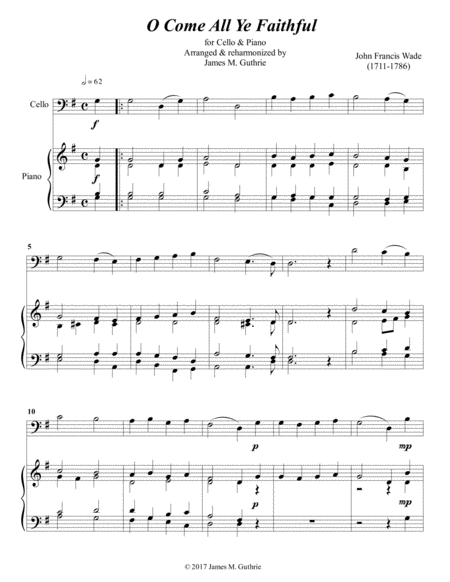Cello,Piano - Level 1 - Digital Download SKU: A0.548509 Composed by Wade. Arranged by James M. Guthrie, ASCAP. Christian,Christmas. Score and part. 4 pages. Jmsgu3 #3388103. Published by jmsgu3 (A0.548509). O Come All Ye Faithful arranged with new harmony for the final verse. Score: 3 pages, part: 1 page. O Come, All Ye Faithful O Come, All Ye Faithful is an English translation of the Latin Christmas carol Adeste Fideles. No one knows exactly who wrote it, but one theory is that it was originally composed by King John IV of Portugal (1604–1656) and revised by John F. Wade and John Reading. Nowadays, we usually attribute it to John Wade. The oldest manuscript from 1751, is owned by Stonyhurst College in Lancashire. Lyrics The English translation O Come, All Ye Faithful was certainly written by Frederick Oakeley, a Catholic priest in 1841. This translation is the most common in English speaking states. To begin with, the hymn had only four verses. Later, the verses grew to eight. Often, various verses are omitted because otherwise, the song is just too long. Some believe the first Latin lyrics were written by St. Bonaventure (13th century) or King John IV of Portugal in the 17th. Though others think it was written by the Cistercian monks. King John IV King John IV of Portugal was called The Musician King. He became king in 1640. In addition to performing the duties of a king, he was also a composer and music journalist. King John built a very large music library. Unfortunately, the library was ruined in 1755 because of the massive earthquake of Lisbon. In addition to his library, the king started a Music School that produced many accomplished musicians. The king also worked diligently to get instrumental music approved by the Vatican for use in his churches. Aside from his authorship of Adeste Fideles, he is famous for another popular choral setting of the Crux Fidelis, a prevalent Lenten hymn. Performance in Context As mentioned above, verses are sometimes left out because all eight verses would take too long to perform. More to the point though, some of the verses may be unsuitable for whatever of the church calendar they are intended. The eighth verse deals with the Epiphany, so it makes sense to sing this on Epiphany Sunday, but not other Sundays. Similarly, other verses are used according to whether the event is Midnight Mass or regular daytime Mass. Register for free lifetime updates and revisions at www.jamesguthrie.com
